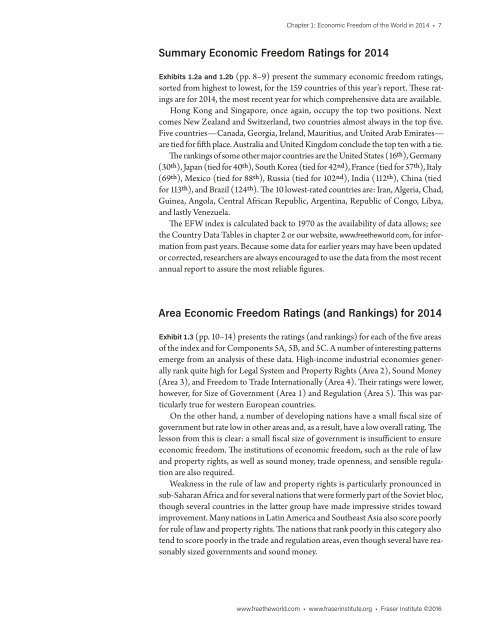Economic Freedom of the World
economic-freedom-of-the-world-2016
economic-freedom-of-the-world-2016
You also want an ePaper? Increase the reach of your titles
YUMPU automatically turns print PDFs into web optimized ePapers that Google loves.
Chapter 1: <strong>Economic</strong> <strong>Freedom</strong> <strong>of</strong> <strong>the</strong> <strong>World</strong> in 2014 • 7<br />
Summary <strong>Economic</strong> <strong>Freedom</strong> Ratings for 2014<br />
Exhibits 1.2a and 1.2b (pp. 8–9) present <strong>the</strong> summary economic freedom ratings,<br />
sorted from highest to lowest, for <strong>the</strong> 159 countries <strong>of</strong> this year’s report. These ratings<br />
are for 2014, <strong>the</strong> most recent year for which comprehensive data are available.<br />
Hong Kong and Singapore, once again, occupy <strong>the</strong> top two positions. Next<br />
comes New Zealand and Switzerland, two countries almost always in <strong>the</strong> top five.<br />
Five countries—Canada, Georgia, Ireland, Mauritius, and United Arab Emirates—<br />
are tied for fifth place. Australia and United Kingdom conclude <strong>the</strong> top ten with a tie.<br />
The rankings <strong>of</strong> some o<strong>the</strong>r major countries are <strong>the</strong> United States (16th), Germany<br />
(30th), Japan (tied for 40th), South Korea (tied for 42nd), France (tied for 57th), Italy<br />
(69th), Mexico (tied for 88th), Russia (tied for 102nd), India (112th), China (tied<br />
for 113th), and Brazil (124th). The 10 lowest-rated countries are: Iran, Algeria, Chad,<br />
Guinea, Angola, Central African Republic, Argentina, Republic <strong>of</strong> Congo, Libya,<br />
and lastly Venezuela.<br />
The EFW index is calculated back to 1970 as <strong>the</strong> availability <strong>of</strong> data allows; see<br />
<strong>the</strong> Country Data Tables in chapter 2 or our website, www.free<strong>the</strong>world.com, for information<br />
from past years. Because some data for earlier years may have been updated<br />
or corrected, researchers are always encouraged to use <strong>the</strong> data from <strong>the</strong> most recent<br />
annual report to assure <strong>the</strong> most reliable figures.<br />
Area <strong>Economic</strong> <strong>Freedom</strong> Ratings (and Rankings) for 2014<br />
Exhibit 1.3 (pp. 10–14) presents <strong>the</strong> ratings (and rankings) for each <strong>of</strong> <strong>the</strong> five areas<br />
<strong>of</strong> <strong>the</strong> index and for Components 5A, 5B, and 5C. A number <strong>of</strong> interesting patterns<br />
emerge from an analysis <strong>of</strong> <strong>the</strong>se data. High-income industrial economies generally<br />
rank quite high for Legal System and Property Rights (Area 2), Sound Money<br />
(Area 3), and <strong>Freedom</strong> to Trade Internationally (Area 4). Their ratings were lower,<br />
however, for Size <strong>of</strong> Government (Area 1) and Regulation (Area 5). This was particularly<br />
true for western European countries.<br />
On <strong>the</strong> o<strong>the</strong>r hand, a number <strong>of</strong> developing nations have a small fiscal size <strong>of</strong><br />
government but rate low in o<strong>the</strong>r areas and, as a result, have a low overall rating. The<br />
lesson from this is clear: a small fiscal size <strong>of</strong> government is insufficient to ensure<br />
economic freedom. The institutions <strong>of</strong> economic freedom, such as <strong>the</strong> rule <strong>of</strong> law<br />
and property rights, as well as sound money, trade openness, and sensible regulation<br />
are also required.<br />
Weakness in <strong>the</strong> rule <strong>of</strong> law and property rights is particularly pronounced in<br />
sub-Saharan Africa and for several nations that were formerly part <strong>of</strong> <strong>the</strong> Soviet bloc,<br />
though several countries in <strong>the</strong> latter group have made impressive strides toward<br />
improvement. Many nations in Latin America and Sou<strong>the</strong>ast Asia also score poorly<br />
for rule <strong>of</strong> law and property rights. The nations that rank poorly in this category also<br />
tend to score poorly in <strong>the</strong> trade and regulation areas, even though several have reasonably<br />
sized governments and sound money.<br />
www.free<strong>the</strong>world.com • www.fraserinstitute.org • Fraser Institute ©2016


